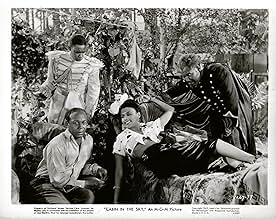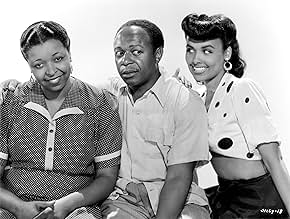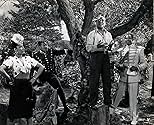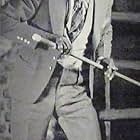IMDb RATING
7.1/10
3.7K
YOUR RATING
A compulsive gambler dies during a shooting, but he'll receive a second chance to reform himself and to make up with his worried wife.A compulsive gambler dies during a shooting, but he'll receive a second chance to reform himself and to make up with his worried wife.A compulsive gambler dies during a shooting, but he'll receive a second chance to reform himself and to make up with his worried wife.
- Director
- Writers
- Stars
- Nominated for 1 Oscar
- 1 win & 3 nominations total
John W. Bubbles
- Domino Johnson
- (as 'Bubbles' [John W. Sublett])
Fletcher Rivers
- Third Idea Man
- (as Moke [Fletcher Rivers])
Leon James
- Fourth Idea Man
- (as Poke [Leon James])
Bill Bailey
- Bill
- (as dancer Taking A Chance On Love)
Ford Washington Lee
- Messenger Boy
- (as 'Buck' [Ford L. Washington])
Nick Stewart
- Dude
- (as Nicodemus)
- Director
- Writers
- All cast & crew
- Production, box office & more at IMDbPro
Featured reviews
This wonderful musical has a LOT going for it: a great cast of noted black actors from stage and screen, songs by Vernon Duke and Harold Arlen, the directorial debut of Vincent Minnelli, etc. But above all, you have a chance to see and hear the matchless singer/actress Ethel Waters in top form, and perhaps begin to understand why many consider her the greatest and most influential jazz/pop vocalist of all time...yes, every great singer who came later, including Sinatra, Billie Holiday, Ella Fitzgerald, etc. had a style which came out of Ethel Waters...and that goes as well for her beautiful co-star in this film, Lena Horne. A must for fans of musicals, jazz, and great music!
My grandfather, Arthur Freed, (and Louis B Mayor) took great financial risks bringing the Broadway play to the big screen. At the time this movie was made, 'black' films were made by black producers, with black directors, and only appeared in black only cinemas. This was the very first movie of its kind to be made for white audiences.
My grandfather brought many talented people to Hollywood including Minnelli and Gene Kelly.
For me the greatest joy is seeing such wonderful performers.
My grandfather brought many talented people to Hollywood including Minnelli and Gene Kelly.
For me the greatest joy is seeing such wonderful performers.
Cabin in the Sky marks the debut of director Vincente Minnelli, one of cinema's greatest and most prolific directors of musicals. Already an experienced stage director, pianist and perhaps most importantly of all a painter, Minnelli came to Hollywood as the protégé of lyricist-turned producer Arthur Freed one of the most significant names in the development of the screen musical.
Although this is one of his cheaper productions (as evidenced by the simplicity of the sets and the use of borrowed footage) Cabin in the Sky is no exception to the typical Freed pattern of assembling a wide variety of musical talent. Here we get to enjoy virtually all the biggest names in black entertainment of the day the gorgeous singing voice of Ethel Waters, the musicianship of Duke Ellington and Louis Armstrong, the dancing of Bill Bailey and John William Sublett, to name just a few. With this line-up, Cabin in the Sky was bound to be a great show, but it was also likely to fall into the same trap as many of the Freed musicals that you might have a great variety show, but not a unified, coherent musical.
This is somewhat the case here, especially as the story is rather flimsy and clichéd. What saves it is Freed's firm belief in the integrated musical (every song woven into the plot) and Minnelli's inventive direction. Freed more or less gave Minnelli free rein over the staging of the musical numbers. Whereas in many of the earlier musicals there is a very conscious break in style whenever a song begins, in Cabin in the Sky each number flows seamlessly into the action. For example, in "Happiness Is a Thing Called Joe", Ethel Waters' singing begins with no prior cues to the audience that a song is about to start. The narrative then leaps ahead to her hanging out the washing while the song continues. The number finishes with Rex Ingram and his Buddy appearing from behind a sheet, leading us into the next scene. The narrative has not taken a break for the song it has continued alongside it.
Also in evidence is Minnelli's graceful visual style. Minnelli, with his painter's eye, delicately frames his subjects with doorways and overhanging branches. You can also see his developing talent for movement flowing in and out of the frame, particularly in the "Li'l Black Sheep" number in the church. Perhaps the most typical "Minnelli" moment is in the large group shot that he puts together for the title song, the camera pulling out to reveal the whole crowd as the singing reaches a crescendo. For all its beauty though, it does seem to be a rather strained effort, and in his later pictures he would stage sequences that were far more complex and yet looked far more effortless.
A quick word about the actors. While most of the cast were hired more for their ability to sing or dance than anything else, those of them taken on purely as actors are nevertheless a joy to watch. Rex Ingram gets to do what he does best in an extravagant performance as "Lucifer Jr.", and is almost as scene-stealing as he was as the genie in Thief of Bagdad. And Butterfly McQueen's role may be small, but at least she really gets to act here, rather than appearing as a comic relief funny voice.
The songs too are wonderful. The Arlen/Harburg numbers which were written especially for the film version are not as good as anything they did for Wizard of Oz, but then what is? The real highlights though are the original Vernon Duke/John La Touche songs, especially the sublime "Taking a Chance on Love", and it's a shame these two barely made a splash in musicals.
In spite of all this, Cabin in the Sky is still best enjoyed as a series of performances. It is wonderful to watch, not least because it is a showcase for the talents of a whole group of entertainers who made far too few screen appearances, but it doesn't stand up as a musical in its own right.
Although this is one of his cheaper productions (as evidenced by the simplicity of the sets and the use of borrowed footage) Cabin in the Sky is no exception to the typical Freed pattern of assembling a wide variety of musical talent. Here we get to enjoy virtually all the biggest names in black entertainment of the day the gorgeous singing voice of Ethel Waters, the musicianship of Duke Ellington and Louis Armstrong, the dancing of Bill Bailey and John William Sublett, to name just a few. With this line-up, Cabin in the Sky was bound to be a great show, but it was also likely to fall into the same trap as many of the Freed musicals that you might have a great variety show, but not a unified, coherent musical.
This is somewhat the case here, especially as the story is rather flimsy and clichéd. What saves it is Freed's firm belief in the integrated musical (every song woven into the plot) and Minnelli's inventive direction. Freed more or less gave Minnelli free rein over the staging of the musical numbers. Whereas in many of the earlier musicals there is a very conscious break in style whenever a song begins, in Cabin in the Sky each number flows seamlessly into the action. For example, in "Happiness Is a Thing Called Joe", Ethel Waters' singing begins with no prior cues to the audience that a song is about to start. The narrative then leaps ahead to her hanging out the washing while the song continues. The number finishes with Rex Ingram and his Buddy appearing from behind a sheet, leading us into the next scene. The narrative has not taken a break for the song it has continued alongside it.
Also in evidence is Minnelli's graceful visual style. Minnelli, with his painter's eye, delicately frames his subjects with doorways and overhanging branches. You can also see his developing talent for movement flowing in and out of the frame, particularly in the "Li'l Black Sheep" number in the church. Perhaps the most typical "Minnelli" moment is in the large group shot that he puts together for the title song, the camera pulling out to reveal the whole crowd as the singing reaches a crescendo. For all its beauty though, it does seem to be a rather strained effort, and in his later pictures he would stage sequences that were far more complex and yet looked far more effortless.
A quick word about the actors. While most of the cast were hired more for their ability to sing or dance than anything else, those of them taken on purely as actors are nevertheless a joy to watch. Rex Ingram gets to do what he does best in an extravagant performance as "Lucifer Jr.", and is almost as scene-stealing as he was as the genie in Thief of Bagdad. And Butterfly McQueen's role may be small, but at least she really gets to act here, rather than appearing as a comic relief funny voice.
The songs too are wonderful. The Arlen/Harburg numbers which were written especially for the film version are not as good as anything they did for Wizard of Oz, but then what is? The real highlights though are the original Vernon Duke/John La Touche songs, especially the sublime "Taking a Chance on Love", and it's a shame these two barely made a splash in musicals.
In spite of all this, Cabin in the Sky is still best enjoyed as a series of performances. It is wonderful to watch, not least because it is a showcase for the talents of a whole group of entertainers who made far too few screen appearances, but it doesn't stand up as a musical in its own right.
This is the sort of film that you'd certainly NOT see being made today and I am sure that "Cabin in the Sky" might make a few out there cringe--with its rather stereotypical characters--including several quite shiftless folks. However, if you can hold on to the politically correct voice welling up inside and just accept the film for what it is, then it's well worth seeing.
This is a highly unusual film for its time. Despite the leading character being a dice-shooting no account, the fact that White Hollywood would produce a film with an all-Black cast is amazing--even if the characters are all either non-threatening "good Negroes" and the rest are "shiftless"--a rather two-dimensional view (at best). Still, if this film hadn't been made, performances by such greats as Ethel Waters, Lena Horne and Louis Armstrong never would have been seen and appreciated by a wider audience. Sadly, when you watch and see Kenneth Spencer in the film, you think of what a loss it was that Hollywood never gave him much of a chance and that he died so young--he had an absolutely beautiful voice.
The film's plot is highly unusual. It's a religious allegory about the soul of one particular shiftless fool (Eddie "Rochester" Anderson). Anderson is given one last chance by God and the angels try to steer him towards good while the devils try to lead him down the path of destruction. And even more unusual is that the film is a singing and dancing musical. Some of the more hilarious performances are by Lucifer, Jr.'s imps. Sure, they are walking stereotypes, but seeing Louis Armstrong, Mantan Moreland and Willie Best acting is very entertaining--the dialog is very funny and original.
Overall, the film is very entertaining and a wonderful showcase for some of the best Black entertainers of the day. Well made and certainly not a movie you'll soon forget.
This is a highly unusual film for its time. Despite the leading character being a dice-shooting no account, the fact that White Hollywood would produce a film with an all-Black cast is amazing--even if the characters are all either non-threatening "good Negroes" and the rest are "shiftless"--a rather two-dimensional view (at best). Still, if this film hadn't been made, performances by such greats as Ethel Waters, Lena Horne and Louis Armstrong never would have been seen and appreciated by a wider audience. Sadly, when you watch and see Kenneth Spencer in the film, you think of what a loss it was that Hollywood never gave him much of a chance and that he died so young--he had an absolutely beautiful voice.
The film's plot is highly unusual. It's a religious allegory about the soul of one particular shiftless fool (Eddie "Rochester" Anderson). Anderson is given one last chance by God and the angels try to steer him towards good while the devils try to lead him down the path of destruction. And even more unusual is that the film is a singing and dancing musical. Some of the more hilarious performances are by Lucifer, Jr.'s imps. Sure, they are walking stereotypes, but seeing Louis Armstrong, Mantan Moreland and Willie Best acting is very entertaining--the dialog is very funny and original.
Overall, the film is very entertaining and a wonderful showcase for some of the best Black entertainers of the day. Well made and certainly not a movie you'll soon forget.
Ethel Waters, you hear her singing style in almost all early singers from the late 20's and 30's. Mildred Bailey, Billie Holiday. She had the clearest voice and such enunciation. She was a miserable woman tho and thats why you never hear other singers give her praise. In this film her singing is as tear jerking today as it was on those old 78's. She sings and you understand every word and in this movie you even can see her do a little shimmy for which she was renowned for early in her career. A great cast. Lena is superb as always and Bubbles from the vaudevillian team "buck and bubbles" along with earl snake hip tucker. These are Harlem legends that ruled 133rd street (the real swing street) in their day. My mother never tires of this movie as she was a devout Ethel fan all her life (she was born in 1923) so she grew up listening to this legend. Get this bit of American history
Did you know
- TriviaThis film is generally credited with the first appearance of the "moon walk" dance step. It is performed by Bill Bailey, brother of Pearl Bailey.
- GoofsDuring the nightclub fight between Domino Johnson and Little Joe, the gunshot he fires accidentally hits Petunia. She falls down on the steps of the staircase, where she drapes her right arm twice over the side.
- Quotes
Petunia Jackson: [after she runs Jim Henry and his crony off] Oh, Lord! Please forgive me for backsliding, but sometimes when you fight the Devil you've got to jab him with his own pitchfork!
- ConnectionsFeatured in The Men Who Made the Movies: Vincente Minnelli (1973)
- SoundtracksLi'l Black Sheep
(1943)
Music by Harold Arlen
Lyrics by E.Y. Harburg
Performed by Ethel Waters (uncredited) and chorus
- How long is Cabin in the Sky?Powered by Alexa
Details
Box office
- Budget
- $662,141 (estimated)
- Runtime1 hour 38 minutes
- Aspect ratio
- 1.37 : 1
Contribute to this page
Suggest an edit or add missing content


































